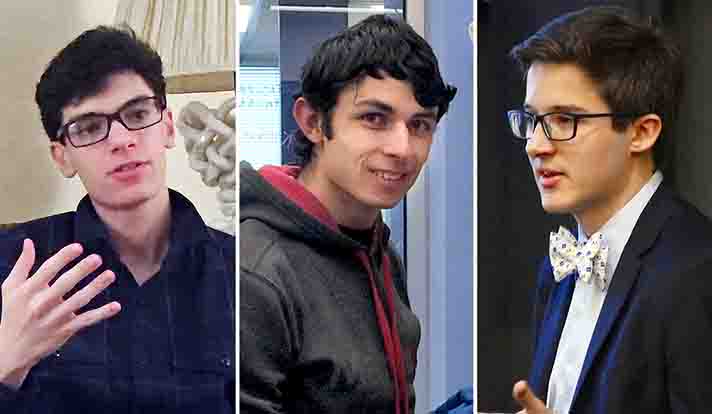
YaleNews
Three Yale juniors have won the prestigious Goldwater Scholarship, a competitive tuition scholarship offered to college sophomores and juniors in science, technology, engineering and mathematics fields.
The Barry Goldwater Scholarship and Excellence in Education Foundation notified Alexander Epstein ’18, Colin Hemez ’18 and Andrew Saydjari ’18 of their award on March 31. Scholarships offered by the foundation cover school fees up to a maximum of $7,500 per year. Epstein double majors in chemistry and molecular, cellular, and developmental biology; Hemez majors in biomedical engineering and history of art; and Saydjari is on track to complete both a B.S. in mathematics and an M.S. in chemistry.
“Yale’s success with this scholarship is a testament to the fantastic mentoring, teaching and research opportunities students have at the university in the STEM fields,” said Director of the Office of Fellowship Programs Rebekah Westphal. “We have traditionally done quite well producing winners.”
The foundation requires that applicants be nominated by their academic institution and limits colleges to four nominations each. One Yale student won the award last year, although three students won the scholarship in 2015 and four in 2014.
For this year’s applicants, achieving the scholarship involved a long, competitive path. After receiving their nominations from Yale through an internal admissions process, the nominees competed in a pool of 1,286 applicants vying for 240 scholarships, according to a press release from the Goldwater Foundation.
Though all three of Yale’s winners are men, 133 of the total 2017 scholars are men and 103 are women. A hundred and fifty-three awardees plan to major in science and science-related fields, 51 in engineering, 22 in mathematics and 14 in computer science.
Like with other fellowship and scholarship opportunities advertised by Yale, student-applicants benefited from a wealth of faculty and administrative support. All three scholars said Yale’s internal review process provided by the Office of Fellowship Programs and their professors helped polish their applications. Nominees work with faculty advisers to revise the research paper component of the Goldwater application, Westphal said, and may receive additional feedback from a committee organized by the Office of Fellowship programs.
Hemez said he would not have received the scholarship without the help of his peers and faculty. Epstein and Saydjari, who said they had similarly positive experiences, said the University offers an ideal balance between hands-on involvement and freedom when providing help for nominees.
“Some schools do more and regularly schedule meetings with you — I don’t really feel that is necessary,” Epstein said. “We have other work too.”
The recipients also found the application itself to be a worthwhile endeavor. Hemez said the required essays, both personal and research-based, are a “great exercise” in understanding an interest in science, and Saydjari noted that the questions allowed him to not only elaborate on his desire to do research as a professor but his love of teaching as well.
Saydjari also noted that he had never completed a product proposal until the Goldwater application required that he write a sample proposal for funding. As a Yale science class later required that he write a product proposal as practice for becoming a graduate student, Saydjari said his experience with the Goldwater application provided him with a head start.
Since it first began giving awards in 1989, the Goldwater Foundation has bestowed 7,921 scholarships worth approximately $63 million.







